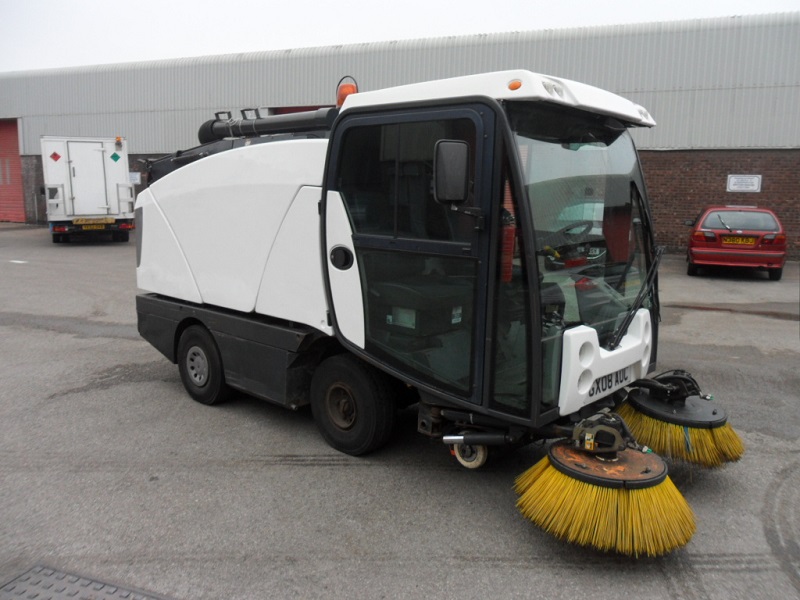Road sweeper
Road sweepers are vehicles that are used to keep roads, pavements and other hard surfaces clean and free from debris. Road sweepers either clean with brushes or with air.
Conventional road sweepers use jets underneath the vehicle body to spray water onto the road surface. This helps to loosen particles and reduce airborne dust. Brushes then scrub the dirt off the surface, while a cylindrical broom-like brush sweeps the debris onto a conveyor belt which leads to a storage container, or hopper, inside the vehicle. Alternatively, a vacuum mechanism may suck up the debris.
Typically, the brushes are capable of spinning at around 4,000 revolutions per minute (rpm).
Regenerative road sweepers use a hydraulic system that forces air into a swirling effect inside a contained sweeping head. A negative pressure on the suction side is then used to suck the debris into the hopper. The truck is fitted with filters that use centrifugal separation to clean the air of the debris, allowing the air to be reused.
These road sweepers are often noisier than conventional sweepers, as an extra engine is required to power the vacuum pump.
Many modern road sweepers are PM10 certified, which means they are capable of collecting and holding particulate matter as small as 10 μm (micrometres), which is often a leading cause of stormwater pollution.
[edit] Related articles on Designing Buildings Wiki
Featured articles and news
A case study and a warning to would-be developers
Creating four dwellings... after half a century of doing this job, why, oh why, is it so difficult?
Reform of the fire engineering profession
Fire Engineers Advisory Panel: Authoritative Statement, reactions and next steps.
Restoration and renewal of the Palace of Westminster
A complex project of cultural significance from full decant to EMI, opportunities and a potential a way forward.
Apprenticeships and the responsibility we share
Perspectives from the CIOB President as National Apprentice Week comes to a close.
The first line of defence against rain, wind and snow.
Building Safety recap January, 2026
What we missed at the end of last year, and at the start of this...
National Apprenticeship Week 2026, 9-15 Feb
Shining a light on the positive impacts for businesses, their apprentices and the wider economy alike.
Applications and benefits of acoustic flooring
From commercial to retail.
From solid to sprung and ribbed to raised.
Strengthening industry collaboration in Hong Kong
Hong Kong Institute of Construction and The Chartered Institute of Building sign Memorandum of Understanding.
A detailed description from the experts at Cornish Lime.
IHBC planning for growth with corporate plan development
Grow with the Institute by volunteering and CP25 consultation.
Connecting ambition and action for designers and specifiers.
Electrical skills gap deepens as apprenticeship starts fall despite surging demand says ECA.
Built environment bodies deepen joint action on EDI
B.E.Inclusive initiative agree next phase of joint equity, diversity and inclusion (EDI) action plan.
Recognising culture as key to sustainable economic growth
Creative UK Provocation paper: Culture as Growth Infrastructure.






















